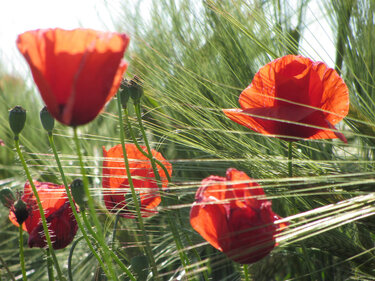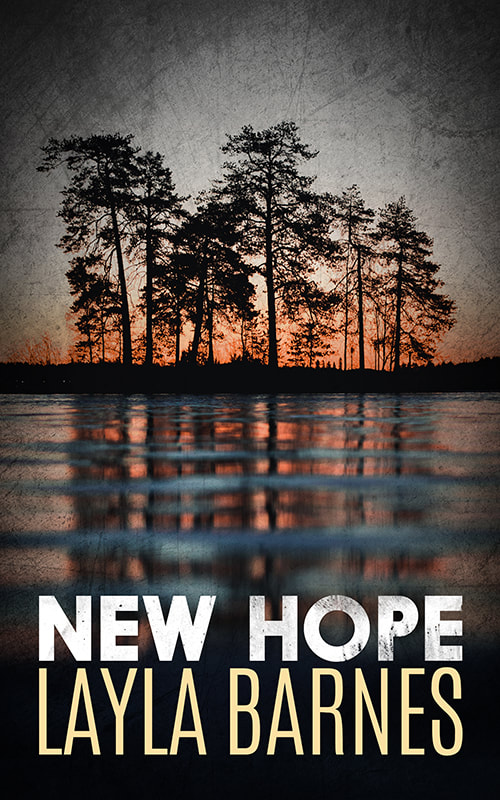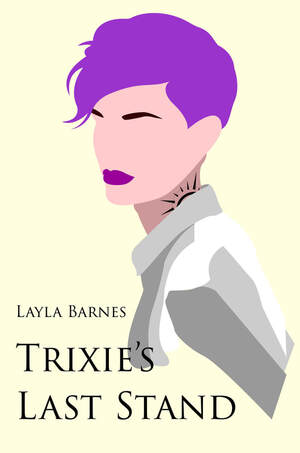|
My heart was racing, and I could feel the force of my blood pounding in my ears. My stomach was in knots, and I had to swallow back the urge to puke. The whole room felt like it was spinning, closing in, collapsing around me. I dug my fingers into the ratty couch beneath me, holding on for dear life until my knuckles went white.
I closed my eyes and forced myself to breathe, trying to wrest some of the dread from my chest, trying to make the world slow down. but it was no use. I was running out of time. The clock was counting down on the faded, flickering screen. There was no picture, just numbers, cold and unforgiving. There used to be hours left. Months, days. Now there were just minutes. Years ago, when the clock first started counting, people used to talk about it a lot. There were always newscasters, musing, predicting, pretending to know more than we did. Five thousand theories were passed through the hallways on anxious lips. Politicians tried to explain it away, to blame anarchists and radicals and everybody but themselves. My sister Bri and I, we used to joke that it was just someone waiting for a grand old oven to preheat. Now, there were no more jokes, no more speculation, just the time. People used to panic, even after they had stopped talking, but it didn’t happen right away. No, at first it was just a sick joke, a teenager making some desperate grab for their fifteen minutes of fame. We waited and waited, but the clock didn’t go away. No one came forward. There was no one waiting in the wings to tell us it was all a game. When that sunk in, it became real. And then came the fear. It was funny how people reacted in the face of a storm. How the fear drove them to run away, evacuate, as if that would keep them safe from the numbers counting down. Or maybe they just wanted to seize the day. Either way, it didn’t matter. They quit their jobs. Stores closed. The whole city seemed to shut down because there was no one left to keep it going. We even stopped going to school, but I didn’t mind it. The speculation was too much. It just made the fear worse. Schools were like that. They tend to have a snow-balling effect. The rumors grew greater and greater until they were too much, until they were crushing, until they had spiraled entirely out of control. So we just stopped and ran away like everybody else. But like everything else, the fear had died down over time, the time that was measured, that we didn’t have. Somehow, people managed to push that constant, ticking reminder to the backs of their minds and keep moving forward. Not anymore. Now, the clock approached ever closer to zero, and it refused to be ignored. It demanded attention, sucked up everything until there was no space left for anything else. Every second seemed to pass by in a sort of unearthly haze, like the world was being filtered through water, the image always just a little bit out of focus, leaving a thousand different versions of reality in its wake. The problem was, no one knew how to tell which was the truth, and we all had to make sense of things in our own ways. We all had to learn how to cope. The way my mother chose to do it reminded me of a bird. A magpie, I think they’re called. Not long after the clock appeared, she started to stockpile things, useless things, like make-up and old compact discs. She called it “being prepared,” but I wasn’t sure what she thought she was preparing for. She flitted about the room, constantly pacing, and her mouth never stopped moving, endless nervous chatter spouting from it like birdsong. But the worst part of it all, was that, like a bird, she developed a tendency to fly away, to flee at the smallest sign of danger. She disappeared sometimes for days on end, always leaving us behind. I looked at her now, mumbling under her breath, pacing restlessly throughout the next room, pausing every once in a while to steady herself on a counter-top as she stumbled and pulled at strands of her fraying, white-blonde hair. Her clothes were stained, her dress torn above the knee, and she kept straightening it, pretending not to be staring at the clock. Her whole body seemed to shake. I could see it on her sunken, hollow face. She wanted to run. I sighed, bringing my fingers to my temple to try to rub away some of the stress. I couldn’t really blame her. Even if I’d wanted to be, what was the use of being angry with only thirteen seconds left? I squeezed my sister’s hand. Bri sat balled up on the hardwood floor, knees hugged tight to her chest, fingers absentmindedly tearing at the end of her once perfect braid, her stoic silence soaking up my mother’s hurricane of noise. I don’t know how she always managed to keep it all together. She was stronger than she should have had to be at her age. But still, I could see the cracks forming in her shell where she was starting to fall apart. I wish I could have brought myself to offer her a comforting smile, to give her something to ease her fragile nerves, but I couldn’t. Besides, what use was comfort with only three seconds left? Finally, my mother stopped pacing and was still. The house felt empty without the sounds of her footsteps echoing from the walls. Two. Bri stood up, letting go of my hand and letting her hair fall. Her legs were shaking. One. I walked over to the television and flicked off the screen. Zero. I was certain the world was going to end today. And then, against all odds, it didn’t.
0 Comments
Poppies. Thousands of them.
Plucked from the earth, delicate petals woven into dozens of flower crowns piled on the ground. Children, little girls, silent, sitting in a broken meadow, weaving more. A half-assembled crown was falling apart in my lap, abandoned. I couldn’t stop my hands from shaking. Children weren’t supposed to look like this. They were supposed to smile. To laugh. Not to cry. Not to be dirty, subdued, alone. But I couldn’t blame them. I was crying too. I could feel the songs of ghosts whipping through the meadow with the wind, turning the air heaving and leaving ice across my soul. Even though I was sitting, I staggered. My head was swimming, unsteady, too full and too empty all at once. I placed my hand on the ground to stabilize myself. I pulled my hand back, and I gagged. My fingers were black, covered in ash. Everything was. Or it would be, if there was anything left. Suddenly, there were broad hands on my shoulders, jarring me from my thoughts, and I jumped. “Sorry,” Alex whispered, lips pressed against the top of my head. “But it’s time.” I sighed, trying to clear my head, but I don’t know why I bothered. I settled for pushing the voices into the background where they were fuzzy and not quite as loud. I stood, taking Alex’s warm, brown hand in mine so I could borrow some of his strength. Together, we started rounding up the kids, collecting the crowns. I was grateful Alex was there to do all of the talking. Most of the kids were too young to really understand, and I couldn’t bear to break it to them. So I just stood there, holding out my arms, and trying not to crush the flowers. And then finally we turned to face all that we had left. Charred foundations of what used to be houses stood scattered throughout the meadow. I could still see pictures of the lives we used to have floating among the wreckage. The lives we had before. Before the bombs that fell and burned our village to the ground and tore apart the earth. Before the war that made everything scarce and put us all at risk. Before almost everyone we’d ever known had died. Before Alex was an expert at making tombstones and I could barely make a poppy crown. I turned to Alex, wondering how his big, brown eyes were still dry. “How did we end up like this?” I asked. “You can’t think about this now, Gill. All we can do now is honor the dead and move forward from there.” He took my hand and lead me through the ruins of the village across to the other side where a whole sea of wooden tombstones marked a sea of shallow graves Alex had dug because I hadn’t had the strength to. But now it was my turn, and I stepped into the sea, one by one laying flower crowns at the head of every grave until we were standing in an all new field of bright red poppies. Flash fiction is one of the hardest parts of fiction to define, probably because it has such a wide range of what it encompasses, from the six-word story to anything under 2,000 words. The point is, flash fiction is the absolute shortest medium of fiction, and because of this, its quite often the most powerful.
When you boil a story down to only its bare bones, there is no space left for anything that doesn’t matter, and only the potent and impactful remains. But the most wonderful thing about flash fiction is that because of its brevity, you can write a piece of it every day in a relatively short amount of time. Practicing is one of the best things a writer can do, especially when they’re experiencing writer’s block on one of their bigger projects. Flash fiction can give an author an opportunity to step away from the bigger picture and flex their creative muscles on a smaller scale, the goal eventually being to stop the cycle of writer’s block that’s tanking the big projects. Flash fiction can also, because of how easy it is to self-publish, be an opportunity for up-and-coming authors to establish a steady readership and gain a following. It’s an easy way for a writer to periodically show potential readers samples of their work in a way that is much more satisfying for the reader than a free sample that ends on a cliff hanger. Flash fiction is not only a useful exercise in improving craft but also in building an author platform. And, it’s a lot of fun, especially in our increasingly fast-paced world in which brevity and convenience can be key factors in getting read. For more information, visit these helpful links: Flash Fiction: What's It All About? What is Flash Fiction? To read some examples of flash fiction, visit these links: Flash Fiction: A series of very short stories for the summer. 21 Flash Fiction Stories to Read While You Wait Anywhere |
CATEGORIES
All
Currently Reading:
Native Tongue by Suzette Haden Elgin From the Author:
Looking for something I've reviewed?
Visit my Bookshop to help support independent book stores! |


 RSS Feed
RSS Feed

